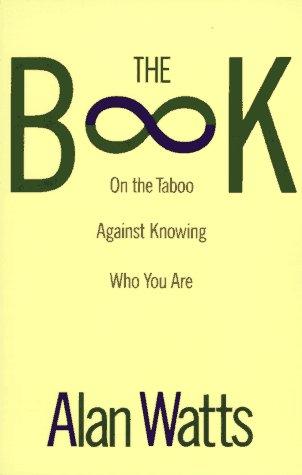sol2070 reviewed The Book by Alan Watts
This is "The Book"
5 stars
(em português → sol2070.in/2024/01/alan-watts-livro-the-book/ )
I've already mentioned "The Book - On the Taboo Against Knowing Who You Are" (1966) by Alan Watts a few times. I remembered it fondly from reading it about six years ago, and I've just completed one of my future re-readings. This time I made a point of buying a physical copy (at a second-hand bookshop) to browse through.
Watts had a degree in theology and even worked as a university chaplain, but he was basically self-taught. He was one of the forerunners of the psychedelic ebullience of the 1960s and is also often described as one of the greatest interpreters of Eastern philosophies for the West. But that's not what this book is about.
It condenses an idea that Watts never tired of conveying, in many different ways, about the true nature of our identity.
We generally consider ourselves to be the body, or some consciousness (or soul) that inhabits it. Although the book mentions Eastern religions (mainly the Hindu Vedanta), this question and its consequences are investigated without adopting spiritual beliefs.
There is no secret. Nowadays this is common sense in significant sections of philosophy and science. Our bodies are expressions of an ecosystem which, in turn, is an expression of the way reality is organized and manifested. The same could be said, in a sense, about our minds or even everything. Nothing exists in isolation and independently.
So far, no shocking revelation. But the consequence of this understanding and insight is that I'm actually not what I thought I was. This insight can gradually guide the way we perceive, think and act. Then everything changes radically, potentially towards something much more open and vast.
Another quality of the book is the engaging prose, which captures much of Watts' oral eloquence.
The essential message is not very different from what the philosopher Spinoza said in the 17th century. But Watts is much more persuasive, musical and psychedelic.
Considering the era, he could not fail to be an incorrigible nonconformist. His reflections often slip, in a way that seems involuntary, into deliciously corrosive socio-political tirades.
Although today he has been elevated almost to the status of a guru, Watts never presented himself as such. Nor was he any kind of role model, joining the predominant club of thinkers with fine words and somewhat despicable behavior. Not that he was an abusive charlatan, but people in his family didn't necessarily admire him.
However, I don't think he was a hypocrite and, besides, who am I to speculate on that...

